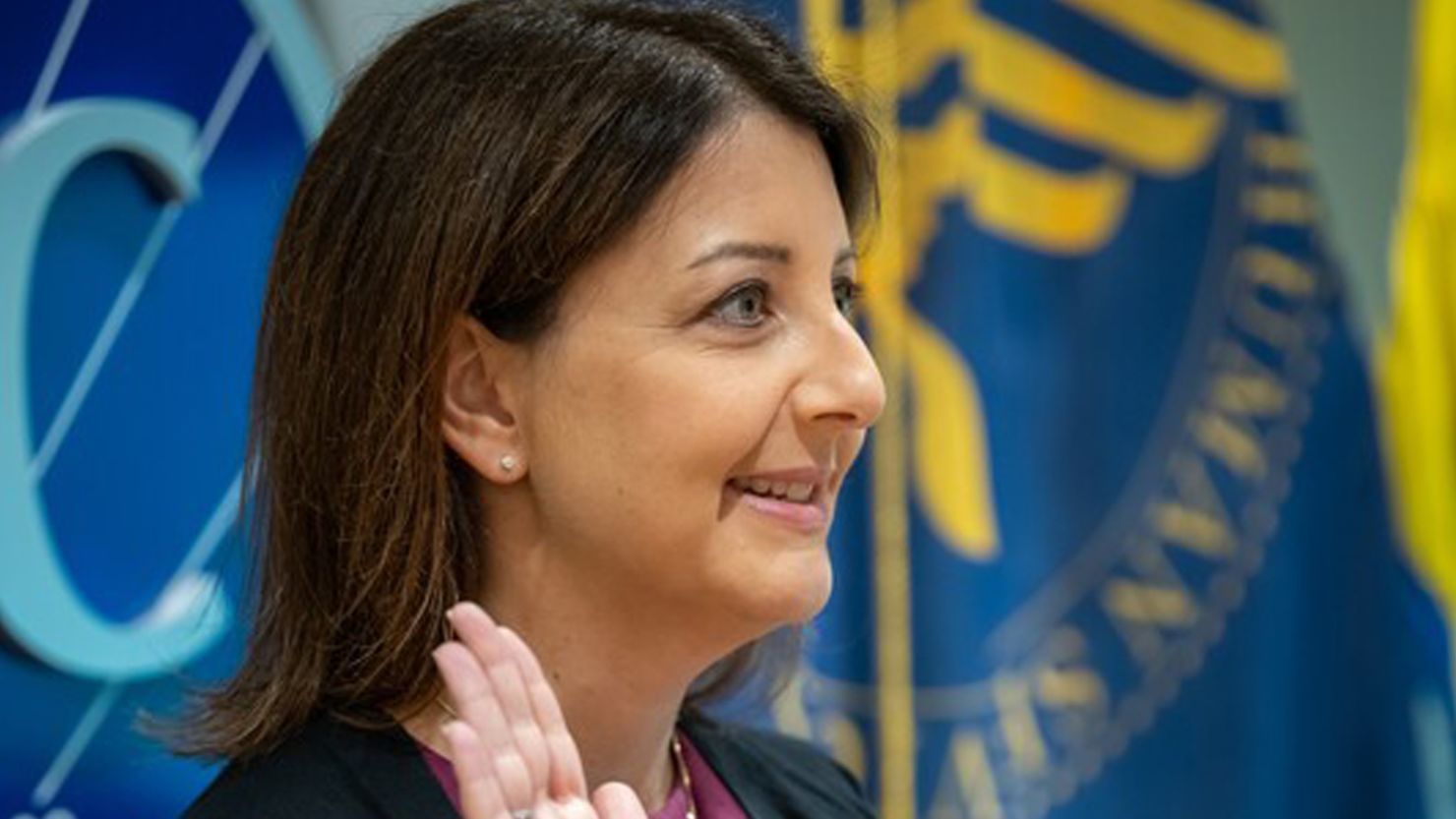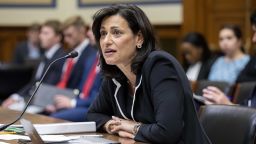As scientists and staff badged into the headquarters of the US Centers for Disease Control and Prevention on Tuesday, the agency’s new director stood waiting for them, a smile on her face and her hand outstretched.
With news cameras rolling in the background and lobby music booming Alicia Keys’ “Girl on Fire,” Dr. Mandy Cohen introduced herself and asked over and over about the state of affairs at the CDC.
Although they’d just met, she asked directly, “What are you most worried about?”
“Thanks so much for actually talking to the people,” one scientist said as he shook her hand and headed to work, a smile on his face.
A day earlier, Cohen beamed as she was sworn in as the 20th director of the CDC. At the age of 44, the internist becomes the head of one of the most important public health agencies in the world – yet had she listened to a beloved professor while in medical school at Yale, she may never have made it this far.
Before graduating in 2005, Cohen went to Dr. Howard Forman to talk about her future.
“She had come with very specific ambitions,” said Forman, director of the MD/MBA program and professor of radiology and biomedical imaging in Yale’s Institute for Social and Policy Studies, of Economics, of Management and of Public Health.
“She saw a broken health care system, and she saw a role for federal and state government in fixing that,” he told CNN.
Forman knew firsthand how difficult health policy reform was, having just returned from a position as a health policy fellow in the US Senate. He also believed there were certain specific career paths for doctors, and the one she was considering didn’t fit the usual prescription.
“My view of the world then was, if it’s never been done, then it’s not likely to be done,” Forman said. “She had this expectation of basically getting out of medical school, doing a residency and immediately going to work in leadership roles in health care. I remember saying to her, ‘that’s just not going to happen.’”
But Cohen quickly proved Forman wrong.
While completing her residency at Massachusetts General Hospital, she also got a masters in public health at Harvard University and immediately took a series of leadership jobs that gave her the opportunity to directly improve public health.
She didn’t do so for power or money, Forman said.
“There’s a phrase in Hebrew, ‘tikkun olam,’ which essentially means ‘repair the world,’ which is a worldview that says leave the world in a better place than you found it,” he said. “That sounds lofty, but it is also worthy, and that’s what I think drives her.”
Fixing a health system that leaves people behind
Cohen’s awareness of the challenges in the US health care system began at a young age.
She grew up in Long Island, New York, with two siblings. Their father, Marshall Krauthamer, worked as a junior high guidance counselor and special ed teacher in New York City. It was their mother, Susan Krauthamer, a nurse practitioner who worked in emergency medicine, who inspired Cohen’s goals.
Through her mother, Cohen saw what a positive impact health care professionals could have on people’s lives, but she also saw “cracks in our health care system which are often amplified in an emergency room,” as she wrote in a blog post for Aledade, a health care nonprofit where she recently worked.
The system, she wrote, “all too often left certain patients behind.”
While an undergrad at Cornell University, where she got a degree in policy analysis and management in the College of Human Ecology, she started thinking broadly about health.
It wasn’t just about medical care. A person’s health also depended on stable housing and work, whereas systemic racism made health worse.
“We need to think comprehensively about non-medical drivers of health,” Cohen told Cornell’s alumni magazine.
When she left Mass General in 2008, she served briefly at the Department of Veterans Affairs as deputy director of Comprehensive Women’s Health Services. The following year, she became executive director of Doctors for America, formerly known as Doctors for Obama, an association started by current US Surgeon General Dr. Vivek Murthy to help champion comprehensive health care reform and to get more doctors involved in supporting President Obama’s health reform agenda. In its current form, Doctors for America is a nonprofit that encourages doctors to speak out about health care reform.
“It’s never been more important for doctors to be engaged,” Cohen told the Yale School of Medicine Magazine in 2010.
During Cohen’s tenure, the group backed Medicaid expansion and legislation that makes health insurance affordable and accessible, as well as working to curb gun violence. Today, it advocates for ways to improve access to abortion, birth control and gender-affirming care.
Creating change from within
In 2010, Cohen left the nonprofit world to join the Obama administration, working in a variety of leadership roles at the Center for Medicare and Medicaid Services (CMS). As a senior adviser to the CMS Innovation Center, she worked with stakeholders to come up with better payment and care delivery models. In other roles, she helped create policies that would help improve access to Obamacare.
In 2015, CMS Administrator Andy Slavitt made Cohen his chief of staff and then chief operating officer.
“She really did run the agency with me,” he told CNN.
Slavitt said he’s pretty good at spotting talent, and “I was more right than I ever could possibly have known” with Cohen.
“She’s just a super human being. She’s very communicative, very thoughtful, very smart, very diligent. And she has she just holds herself to an extremely high standard,” he said.
One thing he admired most was that she seemed “fearless” and was always ready to take on hard issues, he said.
One day, Slavitt said, he asked her why she ran toward the most challenging work. She told him her training as a doctor helped her with that. Often, she said, when a patient got a fatal diagnosis, she wanted to be the one who would tell them, because she knew she could show compassion. She would answer their questions, put her arm around them if it was appropriate and stay as long as they needed.
“’When you ask me to do tough things,’ she said – and I did ask her to do hard things a lot – ’I have the same attitude. I want to be the one to do the difficult things, because they have to be done exceptionally well, with exceptional care and thought.’”
Cohen kept her cool in what might be a defining moment during this time, when she was called in front of the House Oversight and Government Reform Committee to talk about Obamacare’s impact on the insurance market. It was a decidedly unfriendly crowd at the hearing, titled “Poised To Profit: How Obamacare helps insurance companies even if it fails patients.”
After listening to her testimony, Rep. Mark Meadows, R-North Carolina, asked why Americans had to buy insurance that covered services they didn’t need, such as maternity coverage. Prior to Obamacare, pregnancy could be considered a pre-existing condition, and insurance didn’t have to pay for any of those services.
Cohen, who was herself two weeks away from giving birth, reportedly answered his repeated questions with calm and poise.
The ‘three W’s lady’
In 2017, North Carolina Gov. Roy Cooper was looking for someone to run his health department and heard from a number of people that Cohen would be perfect for the job.
He had just won his state’s top office and had learned that its Department of Health had some difficulties. “Staff needed encouragement and a strong leader who believed in what the department could do.”
“We coaxed her to come to North Carolina,” Cooper said.
When he interviewed Cohen, he says, it may have been the first time she’d ever set foot in the state. “Now, I don’t think she and the kids are ever going to leave. They’ve become an integral part of our state.”
Cohen is married to Sam Cohen, a senior vice president for health policy at Curi, a service that provides malpractice insurance. They have two daughters, now 7 and 10.
In her five years as North Carolina’s top health official, Cohen focused on reforming the state’s Medicaid program to become more efficient, improving early childhood health and combating the opioid crisis, all while making health access more equitable.
The state expanded Medicaid in 2023, a year after she left to work for a health care nonprofit, but Cooper said she laid a lot of the groundwork for that expansion. She regularly met with legislators to work on issues that mattered to them.
“I think people on both sides of the aisle appreciate her competence,” he said. “Dr. Cohen, while she understands politics, is not political in her health and science and decision-making.
“Even though she is brilliant academically, she’s also very relatable, and she has a boatload of common sense. She’s a good listener,” Cooper added.
She would need that relatable quality during the Covid-19 pandemic. Cohen appeared in more than 150 news conferences and did many one-on-one interviews about the coronavirus because it was important to be transparent about what scientists knew and didn’t know, she said, so she could build trust with the public and keep them safe.
Some dubbed her “the three W’s lady” because her news conferences often urged the “three W’s”: wearing a mask, washing hands and waiting apart from others.
Cohen became the face of the pandemic response, according to The News & Observer newspaper, which named her the Tar Heel of the Year in December 2020 for her work. Harvard’s T.H. Chan School of Public Health also gave Cohen its highest award, the Leadership in Public Health Practice Award, in 2020 for her pandemic efforts.
In a commencement at Guilford College in Greensboro in May, Cohen said the pandemic – that “dumpster fire of a time” – taught her that trust is the foundation for making positive change in the world.
“Change happens at the pace of trust,” she said.
Cooper said Cohen’s work saved many lives.
Compared with many other Southern states, North Carolina had high vaccination rates and a comparatively low death rate. The nonpartisan National Bureau for Economic Research put it seventh in the country for Covid-19-related deaths per capita. Cohen also said 99% of people over 65 in the state – people who are most vulnerable to the severe effects of Covid – were vaccinated, “with no disparities across our Black or Hispanic communities.”
Not everyone was happy with her pandemic leadership. Sen. Ted Budd, R-North Carolina, sent a letter to President Joe Biden in June in which he called her “unfit for the position” of CDC director. Along with six other US senators and 22 House members, all Republicans, he protested Cohen’s appointment because of her choice to lock down the state, her recommendations for wearing masks and her confidence in vaccines.
Cohen has said she worked hard to build strong relationships with politicians of all affiliations, but the letter’s signers said that don’t like her politics, either.
“Given her strong affiliation with the Democrat Party and the COVID-19 lockdowns, it will be difficult for the American people to trust Dr. Cohen to run the CDC as a nonpartisan actor who makes objective decisions rooted in scientific data, and not in political expediency. Therefore, we urge you to reverse course on Dr. Cohen’s reported appointment to the Director of the CDC,” the letter said.
Passing the baton
Dr. Rochelle Walensky, the immediate past CDC director, praised Cohen’s work in North Carolina and said it makes her well-suited to lead the agency at a critical time in history. She will make herself available for any questions Cohen has, she said, but she has confidence in Cohen’s abilities.
Walensky is “passing the baton to an incredibly capable, smart woman who has her own incredible track record in health and public health,” she told CNN. “She is going to receive a place that is full of people who care deeply, who are deeply expert in the work that they are doing.”
Cohen will have her work cut out for her at the top of the CDC. Polls have shown that Americans’ trust in the agency has slipped over the years. After the CDC acknowledged last year that it has made some missteps during the pandemic, Walensky created plans to remake the agency so it would respond faster in a public health crisis and work better with other agencies. The goal is to also simplify and streamline the agency’s website to get rid of contradictory and confusing public health guidance.
Dr. Ashish Jha, former White House Covid-19 response coordinator, said on Twitter on Monday that Cohen’s combination of public health and health care knowledge “is extremely rare,” and he’s “thrilled” that she accepted the nomination and is taking on “the challenge of reforming and improving the CDC.”
Get CNN Health's weekly newsletter
Sign up here to get The Results Are In with Dr. Sanjay Gupta every Tuesday from the CNN Health team.
“Her intelligence, her temperament, and her unique blend of experience makes her a terrific choice to run @CDCgov at this moment,” he said.
Cooper said Cohen is the right person to lead the CDC, just like she did with the North Carolina department.
“She is the kind of person who has a positive can-do attitude, a strong work ethic, and she instills confidence in leadership and encourages people to get on board and to follow her lead,” he said. “And I think that having worked in North Carolina, having turned our Department of Health and Human Services around, she can use that experience to help lead the CDC, along with all of the federal experience she already had.”
Forman, Cohen’s medical professor at Yale, said he too is optimistic about what she can do at the CDC. And he is especially glad that she ignored his career advice.
“Thank God for everybody that she did, because she basically has done everything that she hoped she could do, and maybe more. And obviously there’s a lot of work yet to be done, but her career has been committed to improving the world through policy and through the actual delivery of health care,” he said. “Sometimes, you have to work within systems to make change.”





